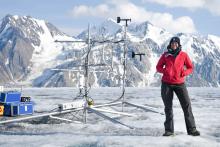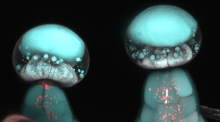News
-

Protist expert awarded top UBC research prize
February 6, 2020
Patrick Keeling, a botanist who studies protists, single-celled organisms with a complex evolutionary history, has been awarded UBC's top research accolade, the Jacob Biely Faculty Research Prize. Keeling's work has uncovered clues into the evolution of the parasites that cause diseases such as… read more
-

New quantum switch turns metals into insulators
February 3, 2020
Most modern electronic devices rely on tiny, finely-tuned electrical currents to process and store information. These currents dictate how fast our computers run, how regularly our pacemakers tick and how securely our money is stored in the bank. In a study published in Nature Physics,… read more
-

Women in Science: Malabika Pramanik
January 27, 2020
Women who say that they strongly self-identify with mathematics are less likely than men to pursue a major in math. Why does this happen and how can we improve diversity in STEM fields? UBC mathematician Malabika Pramanik says that we need to first acknowledge this issue and then analyze the… read more
-

A new home for life science students at UBC
January 17, 2020
Students can now study for careers in the life sciences – including genetics, healthcare, conservation and ecology – in renovated and expanded Undergraduate Life Sciences Teaching Laboratories at the University of British Columbia. The $91-million project, officially opened today,… read more
-

Mysterious fast radio burst tracked down to nearby galaxy
January 6, 2020
Astronomers in Europe, working with Canada’s CHIME Fast Radio Burst collaboration, have pinpointed the location of a repeating fast radio burst (FRB) first detected by the CHIME telescope in British Columbia in 2018. It's only the second time scientists have determined the precise location… read more
-
New laser technique images quantum world in a trillionth of a second
December 10, 2019
For the first time, researchers have been able to record, frame-by-frame, how an electron interacts with certain atomic vibrations in a solid. The technique captures a process that commonly causes electrical resistance in materials while, in others, can cause the exact opposite—the absence… read more
-

Tracking BC’s vanishing glaciers
December 4, 2019
Western Canada’s glaciers are retreating quickly in the face of climate change, potentially putting BC’s water supply, agricultural output and power production at risk. UBC geophysicist Valentina Radic is working to improve projections of glacier loss, and its impact on stream flow and… read more
-

How ancient microbes created massive ore deposits, set the stage for early life on Earth
November 27, 2019
New research in Science Advances is uncovering the vital role that Precambrian-eon microbes may have played in two of the early Earth's biggest mysteries. University of British Columbia (UBC) researchers, and collaborators from the universities of Alberta, Tübingen, Autònoma de… read more
-

Aerial drones offer new perspective on resident killer whale behaviour
November 4, 2019
Scientists at the University of British Columbia are getting a rare glimpse into the underwater behaviour of northern and southern resident killer whales off the B.C. coast, with the help of aerial drones. The unique footage, filmed in collaboration with the Hakai Institute, will help… read more
-

The frostier the flower, the more potent the cannabis: UBC study
October 28, 2019
Cannabis flowers with the most mushroom-shaped hairs pack the biggest cannabinoid and fragrance punch, according to new research from the University of British Columbia. While the cannabis leaf is iconic, it’s the chemicals produced by the tiny, frostlike hairs on cannabis flowers that give… read more
